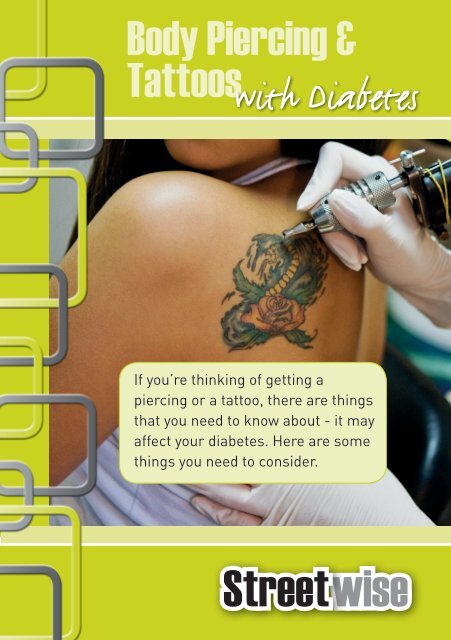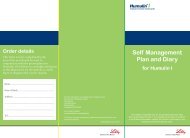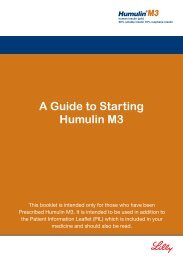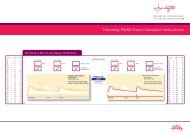Body Piercing and Tattoos with Diabetes
Body Piercing and Tattoos with Diabetes
Body Piercing and Tattoos with Diabetes
- No tags were found...
Create successful ePaper yourself
Turn your PDF publications into a flip-book with our unique Google optimized e-Paper software.
Put your health firstInfections, what to look out forYou should not get a piercing or tattoo done if youare already unwell, or if your diabetes control hasnot been good recently. People <strong>with</strong> diabetes can bemore susceptible to infections <strong>and</strong> take longer to heal,especially if their diabetes is not well controlled.Poor control or illness increase the riskof problems after the piercing or tattoohas been done. Wait until you arefeeling better & your blood sugars areunder control.Any piercing or a tattoo means that the surface of theskin has been broken (like having a small operation)<strong>and</strong> the broken skin needs to heal.• Any time the skin is broken there is a risk of an infectiondeveloping, <strong>and</strong> <strong>with</strong> piercing & tattoos there are 2 types ofinfections that may occur.• You may be at risk of catching infections transmitted inthe blood (such as hepatitis), if the person performing thetattoo or piercing hasn’t cleaned & sterilised all of theirequipment properly.• Skin infections (bacterial infections) that may lead toserious problems if not treated quickly. These problemsinclude diabetic ketoacidosis, toxic shock syndrome orblood poisoning.• There is also a risk of scarring(keloid scars) <strong>with</strong> piercing; thesescars may be large & lumpy aroundthe pierced area. The personperforming the piercing
Afterwards...• The person performing the piercing should give youadvice on how to look after the area that has beenpierced. Follow this advice. Ask them before youget a piercing done what advice they recommend. Ifthey can’t give you any, find somewhere else to go.• A lip or tongue piercing will make eating& drinking uncomfortable & difficult for afew weeks, <strong>and</strong> may cause unsteady bloodsugars.• If the area around the piercing becomesred, painful, swollen, or you notice anysticky can be yellowish or greenishdischarge then the area is likely tobe infected. You should see a doctorimmediately.• If the area does become infected then youmight have to remove the piercing to helpin treating the infection. To leave it in willmake the infection harder to treat <strong>and</strong>increase the risk of scarring.• Test your blood sugars more frequently if your piercingbecomes infected, <strong>and</strong> test for ketones in your bloodor urine. If your blood sugars are high or you find anyketones contact your diabetes specialist nurse.• If you feel ill in the first few weeks after you have apiercing, then it may be because of an infection caused bythe piercing - contact your diabetes specialist nurse, asyou may be at risk of developing diabetic ketoacidosis.
Contact NumbersOther leaflets are available in thisseries that may be helpful for you:• Annual Review• Travelling• Drugs• Sensible Drinking• Emotional well being• Exercise• High Blood Glucose• Insulin Pumps• Sex <strong>and</strong> Beyond• Looking After Type 1 <strong>Diabetes</strong>• Top Tips for SchoolAsk your diabetes team for the onesyou want.Further information is available fromEli Lilly <strong>and</strong> Company LimitedLilly HousePriestley RoadBasingstokeHampshire RG24 9NLTel: (01256) 315000www.lillydiabetes.co.uk/patientsSchool Nurse:<strong>Diabetes</strong> Specialist Nurse:<strong>Diabetes</strong> UK Central OfficeWeb: www.diabetes.org.ukEmail: info@diabetes.org.ukTel: 020 7424 1000Juvenile <strong>Diabetes</strong> Research Foundation(JDRF)Web: www.jdrf.org.ukEmail: info@jdrf.org.ukTel: 020 7713 2030SamaritansConfidential help for anyone who isexperiencing feelings of distress or despair,including those which may lead to suicide.Web: www.samaritans.org.ukEmail: jo@samaritans.orgTel: 08457 909090ChildLine get help <strong>and</strong> advice about a widerange of issues.Web: www.childline.org.ukTel: 0800 1111Ask Brook Free <strong>and</strong> confidential info forunder 25’sWeb: www.brook.org.ukTel: 0808 802 1234 - free from alltelephones including mobile phonesText: Ask Brook on 07717 989 023(st<strong>and</strong>ard SMS rates apply)Provided by Lilly as a support to medicine <strong>and</strong> patients <strong>with</strong> diabetes.This leaflet has been written by the RCN Children <strong>and</strong> Young People <strong>Diabetes</strong> Community (CYPDC).Lilly’s involvement is limited to printing cost <strong>and</strong> a review of the content for medical accuracy only.UKDBT001333 October 2012DIABETES










![Humalog Mix50 (50% insulin lispro [rDNA origin] injection ... - LillyPro](https://img.yumpu.com/44269187/1/184x260/humalog-mix50-50-insulin-lispro-rdna-origin-injection-lillypro.jpg?quality=85)

![Humalog Mix25 (25% insulin lispro [rDNA origin] injection 75 ...](https://img.yumpu.com/35487335/1/184x260/humalog-mix25-25-insulin-lispro-rdna-origin-injection-75-.jpg?quality=85)



